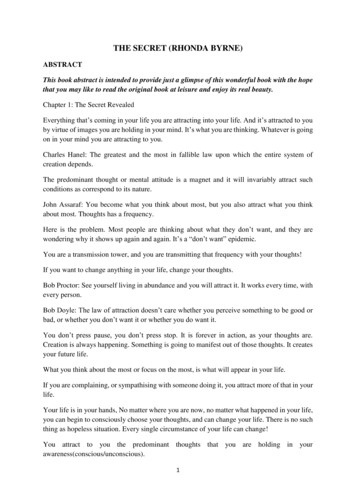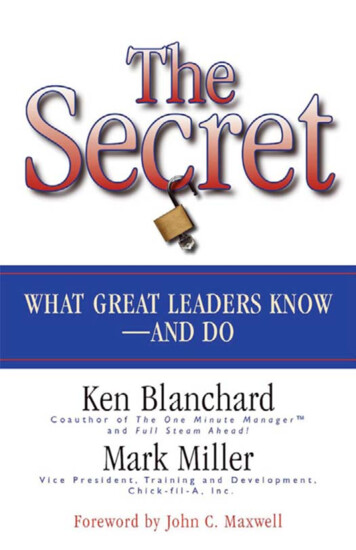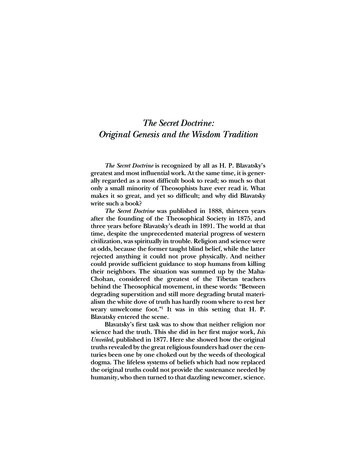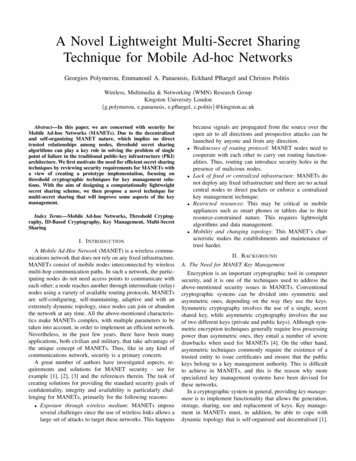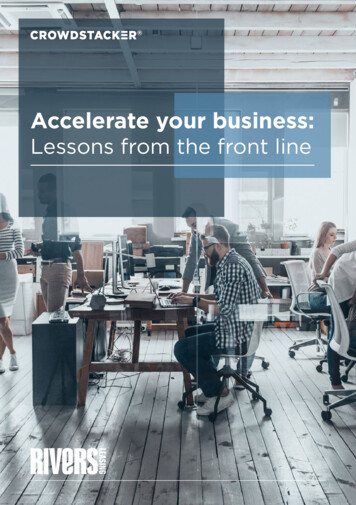
Transcription
TheSecretAccelerate your business:Lessons from the front line
Accelerate your business:Lessons from the front lineThe Secret.03The secret.Don’t know your recipe?Is all change the best idea?Greater than the sum of its parts.Measurement, Pragmatism, Activity.07The Tortoise & the Hare.If you can keep your head.Eyes on the prize.Balancing Business.11Get your business in balance.Building balanced relationships.Don’t be a wallflower.Balanced business planning.Finding Funding.16Where is the money?Taking the alternative route.Why ‘alternative’ could be better.Financing a great future.2.
TheSecretRatan Daryaniby Ratan DaryaniExecutive Chairman & Founder,Rivers LeasingPackaging is essential. Experienceof the product is indispensable, andscent can seal or destroy the deal.Ratan Daryani is afinancial entrepreneurwith many years experienceworking with both public andprivate organisations.However, the secret formulation canbe the killer ingredient which createscult followings, sell-out smash hitsand timeless products which sell aswell today as they did when theywere launched decades ago.He has extensive knowledge ofturning around the fortunes ofstruggling businesses, and buildingbrands from scratch.Think Chanel No. 5, Elizabeth ArdenEight Hour Cream or Crème de laMer. All these products have titaniumstrength brands, loyal and almostunwavering customer bases, and theability to transcend generations toconstantly win new customers.A great deal of his career has beenspent in the international cosmeticsindustry, and here he shares hiswisdom with other entrepreneurslooking to build exciting andinnovative businesses.In all my years working in business,and with businesses, one of the mostinteresting lessons I’ve learnt is thatsuccess comes from having your ownsecret formula.The secretThis enables companies, whetherthey are bakers or plumbers, ITconsultancies or lawyers, tosuccessfully sell to customersand maintain or grow theircustomer base.The cosmetics and beauty industryis all about secret potions. Whetherit’s the element of fairytale or myth,there is something irresistible aboutthe concept of a secret ingredient orsecret potion.This formulation is at the heart of thesuccess of a product.3.
It could be any of these, or all ofthem. In any combination. In anyratio.Don’t knowyour recipe?When we began building RiversLeasing we knew we needed toidentify exactly what we were goingto offer that would be different toeveryone else, and this is an exerciseI would encourage any businessowner to go through, whatever stagethey are at in the enterprise lifecycle,and particularly if it’s just at the start.If you run your own business it’spossible that even you don’t knowyour own secret formulation. Wespeak to successful business ownerseveryday who can’t necessarilycorrectly identify all the keyelements that make their businesssuccessful.Using Rivers Leasing’s own industryas an example, it is possible toillustrate exactly this point. Businessfinance has been around formillennia in some form or another.There’s nothing new about providingfunds to entrepreneurs in returnfor some form of interest. So thequestion is how can you run aleasing business in a way that iscompelling for potential customers?This is by no means unusual, but itcan be dangerous. As a businessowner you need to know andfully understand what makesyour business work. Only in thisway can you be sure you won’taccidentally change or get rid ofthe key ingredients and only in thisway can you be sure you can focusinvestment and development to domore of what makes you the best.The answer is innovation.Our secret ingredient is actuallyabout our ability to evolve anddevelop different methods ofproviding finance to businesses.Maybe it’s your staff and offeringexcellent service. Or it could be youractual product which stands outas something different from othercompetitors in the market. Price is ofcourse a key element – are you ableto undercut or offer the best valuefor money?This is what keeps our customersengaged and interested, and at thesame time keeps our competitorsguessing and trying to keep up.4.
Is all changethe best idea?Our greatest failures, our greatestsuccesses, and even the hum drumeveryday occurrences all add to ourknowledge base.On their own these lessons areimportant, but together they can beextremely valuable. The experienceand expertise of your team, thecommunication between differentparts of your business and theleadership provided by managementturn this into something exceptional,all enabling this value to be realised.In 1995 Coca Cola decided to takethe radical step of changing thesecret formula that had been usedto create its flagship drink since thelate 19th century. The new tastingproduct was aptly called ‘New Coke’,but it absolutely bombed, so muchso that the company had to rapidlyreintroduce the original product inan attempt to stem the further lossof market share.Think, for example, of a house.Essentially it is built from someplanks of wood, some bricks, somenails, some tiles, some floorboards,and so on. It is built using theresources of tradesmen such asplumbers, bricklayers and plasterers.As far as changing secret formulasgoes, this was a disaster.However, this doesn’t mean abusiness’s secret recipe shouldn’tchange. Perhaps the best guideis ‘if it isn’t broken, don’t fix it.’Don’t change something that isworking. Develop new ideas, createnew opportunities, but run thesealongside what is already workingwell.However, the value of the housedoes not equate with the valueof these items or the cost of thetradesmen’s time. Together theingredients create something withfar more value – the potential to benot just a roof over someone’s head,but to be someone’s home.Greater than the sumof its partsIn all the businesses I havebeen involved in wehave tried hard tobring together thedifferent parts ofthe business tocreate thisextra value.Perhaps the most secret part of therecipe is the magic ingredient thatturns everything into somethinggreater than the sum of its parts.Indeed, the lessons you learnthroughout your working life canall potentially add up to somethingeven more valuable. Every situationoffers a potential learning point.5.
Do you have strong lines ofcommunication between thedifferent areas of the business? Doyou make it easy for the learningsof one team, or one person, to beshared with others, and are yousupporting team management andproviding the leadership neededto ensure everyone is pulling in thesame direction?At Rivers Leasing we have teamsof people who deal with everythingfrom financial management to HR,legal work to cleaning the offices.Everyone’s contribution createssomething that works seamlessly(most of the time!) and fairly for allstakeholders, and we hope we are ajoy to work with.The value of this for our clients andsuppliers is immense, and in turnthis means we often enjoy repeatbusiness, we benefit from referralsand we can grow the business.In short, work out what your secretformula is. Figure out how to domore of it, think about what otheropportunities this opens up, andwork hard to keep your businessoperating smoothly and efficiently soyour recipe has the best chance ofsuccess.If you run your own business thinkabout how the constituent partsall come together to operate andconsider how you can make use ofthe magic ingredients you have.“ Considerhow you canmake use ofthe magicingredientsyou have”6.
Measurement.Pragmatism.Activity.by Tim Shand,Business Development Director,Rivers LeasingTim ShandIn my 35-year career I’ve seen theexcess of the ‘80s, the uncertaintyof the early ‘90s, the dotcomboom and the bust of the GlobalFinancial Crisis. But nowhere on thatrollercoaster ride have I come acrossany evidence to suggest it is betterin the long run to fling yourself intothe fray with complete, unthinkingabandon.Tim Shand has been helping Britishbusinesses for the entirety of his35-year career. Primarily workingin asset financing and leasing, hehas built up a wealth of experiencearound management and growthstrategies, for small and largebusinesses.The businesses, and businesspeople, with true staying powerhave shown themselves time andagain to be those who can keep theirheads, recognise and make use ofopportunities, but never lose sight ofthe law of averages.Here Tim shares some of the piecesof advice he was given during hiscareer, and which he feels havemade a positive impact on his ownsuccess.Like the tortoise in the fable, Ibelieve true success comes frompacing yourself with measuredresponses, an ability to executestrategies that are practical andrealistic, and to keep plugging awayat what you’re doing knowing thatyou’re doing it as best you can.The Tortoise& the HareMeasurement. Pragmatism. Activity.These are the three key words Iwould say to anyone looking foradvice about how to run asuccessful business.7.
If you can keepyour headHowever, if you allow yourself to getirate twice, then the power of theemotion is immediately lessened.If you are lucky they might still makea show of responding to what yousay, but they are likely to be lessmotivated to actually help.At the risk of simply repeatingRudyard Kipling, it really is essentialto try your best never to lose yourcool when running a business.If you allow yourself to get iratea third time or more, very quicklythe effect on those around youcompletely dissipates. You, andthe frustrations you are trying tocommunicate, will be dismissed asthe rantings of someone who justcan’t deal with everyday pressures.We are all too aware of the dangersto our health and wellbeing causedby stress, and the pressures inmodern society to perform to ourbest or risk losing it, so the ideaof ‘keeping your head’ could seema little anachronistic, but this isn’tabout not admitting when you feelthe strain. It isn’t about bottlingup emotions, and it isn’t abouttrying to never actually feel angry.Instead it’s about allowing yourselfto experience all the emotions thatinevitably come when you’re workinghard at something, but not to letthem take you over so you stopthinking straight.Running a business can bestressful. Running a business canbe frustrating. Running a businesscan be frightening. All of theseare perfect ingredients for losingyour cool and letting your negativeemotions get the better of you.Whenever I’ve felt this way I haveheard my old manager’s mantra inmy head and it has always given mepause to think before acting. I don’twant to use up my ‘anger allowance’,so I stop, take a breath, and then tryto deal with an annoying situation ina way that won’t exacerbate it.Years ago a rather fierce (butsecretly kindly) manager I workedfor, explained to me that he tried tolive by the mantra ‘you can only getreally angry at work once’.He said he’d long figured out thatif you got irate once then peoplewould probably listen, take note, andmight even act accordingly to rectifythe situation.It’s worked so far for me, and ofcourse, I plan to have a huge tantrumon the day I retire!8.
Eyes on the prizeMy target as a junior salesman wasto achieve something in the regionof 200,000 sales each month.My second piece of advice wouldbe to always focus on the activityyou set out to achieve. Whateveryour trade, focus on being the bestpractitioner of it that you can be.Initially I thought that if I couldget two 100,000 deals over theline then I could put my feet up forthe rest of the month, safe in theknowledge I had achieved my goaland my manager would be happywith me.Time and again I have seenbusinesses come a cropper whenthey have started to value the wrongthings. Targets can be a primeexample of this.So it was, until the first month whenI found one of the larger value dealsI had been chasing just didn’t comethrough, so I didn’t just fall shortof the target, I missed it by a hugepercentage.When I was working in leasing 30plus years ago we were each giventargets for the value of the dealswe completed on a monthly basis.The result of this was that we wentchasing the bigger value dealsbecause in effect this meant doingless work to achieve or exceed ourtarget.What I quickly realised was thatI should focus on creating 10 20,000 deals, so that when oneor two of them fell through, asthey statistically always will do, theshortfall against my target was muchsmaller.On the face of it this sounds like anobvious and brilliant strategy, but ofcourse it ignores a key fact: if youare chasing fewer, higher value deals,when you lose business, youlose more.9.
Of course, when I started doing this,each month I was beginning to buildup to 10 good relationships withexisting or potential new clients,rather than just two.By prioritising doing more of whatI was doing, in this case creatingleasing deals, and not prioritising thevalue of the deals I was working on,I became more and more successfulin a steady, and ultimately far morefruitful way.Over the course of the year thatmeant I worked with 120 businessesinstead of just 24. So the next yearmy task would potentially be abit easier because I already had amuch bigger pool of solid businessprospects in which to fish.From what I can see working withmany different types and sizes ofbusinesses for the last 35 years, thisapplies across the board.After all, most businesses are startedby people who have a vision oran idea, or who have a particular,commercially valuable skill. So itmakes sense to always focus on that.Focus on doing whatever yourbusiness does, as best youcan and the financialsuccess willfollow.“ Measurement.Pragmatism.Activity.”10.
BalancingBusinessby Rishi ShahBusiness Operations Manager,Rivers LeasingRishi Shahtimes, appear catastrophic. And,walking this tightrope also meansyou are constantly challenged tokeep your balance. Whether it isbalancing cash coming in versuscash going out, or working throughthe need to invest in new technologyto remain competitive whilst alsotrying to minimise expenditure.There is always something pushingand something pulling when you runa business.Rishi Shah is the business operationsmanager for Rivers Leasing. Oneof his main responsibilities is thefront line underwriting of lease andloan proposals. Here he looks at theimportance of balance when runninga business, both in terms of keepingthe business financially stable, butalso in terms of relationships withstakeholders.Over the course of my career I’veworked with many businesses andone key lesson that has struck meis this issue of balance. To do justenough, but not too much. To takeenough risks, but not too many.To invest sufficient funds, but notoverspend.Get your business inbalanceRunning a business can often feel abit like walking a tightrope. Gettingto the ‘other side’ is the ultimateprize, whether that ‘other side’is building an enterprise whichcan ultimately be sold for a largeprofit, or creating a business thatis sustainable and provides youand your employees with a steady,reliable income.It isn’t always easy to get it right,but it’s a skill worth cultivatingif you want to establishand build yourbusiness.You don’t want to look down toooften because it can be scaryup there on your own, andthe consequencesof failure can, at11.
Building balancedrelationshipsUsage of social media for business isjust as astounding. LinkedIn has over450million users worldwide. And88% of businesses use Twitter formarketing purposes.Business relationships are at theheart of most, if not all businesses.If you have any millennials workingin your business chances are theyare using social media for socialand business purposes on an hourlybasis, using multiple platformsfrom Snapchat to Twitter, anddoing so using their mobile devicesrather than their desktop. Indeed,business networking and relationshipmanagement is far different todaythan it was twenty, or even ten yearsago.Customers, suppliers, partners,competitors, as business ownersthere is a requirement on you andall external facing staff to buildcollaborative and productiverelationships with real people. Theadvent of social media and digitaltechnologies has been both a godsend and a blocker to creating these.The statistics from a recent pieceof global research tell a fascinatingstory. A huge majority of workers,86%, report they consider emailto be their favourite way tocommunicate, which seems a goodthing given the average workerreceives 121 emails per day.Yet despite this, one of the keylessons I have learnt in my careeris that face-to-face contact andbuilding real relationships with realpeople has a value that still can’t bematched by technology.One of the key changes we havemade at Rivers Leasing in the pastfive years has been to put moreemphasis on getting out there andactually meeting the people wedo business with on a day-to-daybasis. Whether it’s brokers, clients orpartners, actually making the effortto travel to their place of work andsit down to discuss issues and workthrough current discussion pointspays huge dividends.That’s about 15 emails every hour.If you think most of these willcommunicate some sort of requestor required action, that means everyworker is receiving a new piece ofinformation or something to add totheir to-do list every four minutes.12.
Since we instituted this we have seenthe financial benefits. For example,one broker we have worked with formany years but previously dealt withmainly over the phone, we now meetwith on average twice a year. Sincewe started this the value of businesswe’ve seen from them has increasedby nearly 100%.With experience you come to realiseeveryone in that room is feeling thesame to a lesser or greater extent.And so it follows that your audienceis naturally disposed towardssympathy, or at least empathy, withyou if you are struggling to makecontact.Once you understand that, the taskof approaching a group of peopleat a work event becomes a wholelot easier. This isn’t the playgroundand you aren’t seven years old. Thepeople you want to go up and talk toare not going to taunt you and callyou names for daring to approachthem. More likely they will berelieved to have someone to talk to ifthey are standing on their own.And if they are in a group theneveryone will be relieved thatsomeone else has joined whocan potentially freshen up andreinvigorate the conversation.Whilst technology has undoubtedlycreated seismic shifts in how wework, and these shifts have beenhugely beneficial, there is stillsomething to be said for balancingthis with good old fashionednetworking. Afterall, you spendmost of your waking time during theworking week dealing with people,it makes complete sense to get toknow them. And in doing so you willreap the benefits.Don’t be a wallflowerPerhaps the best piece of advice Iwas ever given about being in thesesituations is to have a plan. In thisway you can control what outcomesyou are looking for, and you canset yourself targets to decrease thechances of you opting out earlyon and making yourescape too early.We’ve all been there. Conferences,awards dinners, industry exhibitions.These can be terrifying if you don’tknow many people but are there tomake friends and influence people.Your heart beats faster, your mouthgoes dry, what you really want to dois make a swift exit and pretend it allnever happened. But deep down youknow you’re going to have to takethe plunge and work theroom.13.
particularly useful and makes iteasier to remind someone the dayafter you met, or to swap basiccontact details. And you can also useit to easily discover other contactsyou might have in common.Targets could be as simple aslocating three key people youwant to introduce yourself to. Andensuring that you speak to them,however briefly, so that you can thenconnect with them after the event –either using the far less demandingmedium of email, or suggesting aproper meeting.So don’t rely on email and facelesscommunication. Get the balanceright and get out of the office, shop,factory, or wherever you work, totake the time to meet people inperson.If you repeat this exercise at eachevent you attend very quickly youwill find that you actually knowmore and more people in theroom, so networking gets easier andeasier.And this is a situation wheresocial media is incrediblyuseful. LinkedIn iscould“ Targetsbe as simple aslocating threekey people youwant to introduceyourself to.”14.
Balanced businessplanningIf you don’t have a full appreciationof your business’s financial positionthis is not a balanced approach tobusiness management. And if youdon’t take a balanced approach tobusiness management you can’t takea balanced approach to businessplanning.Undoubtedly you’ll have heard someof these: ‘Death by numbers’, ‘thedevil’s in the details’, ‘don’t countyour chickens’.Hundreds of business financeapplications come across my deskevery month. And in most cases, bythe time the application reaches meor one of my team, all the relevantand necessary information isprovided.We’ve all seen it on Dragons' Den:the moment a budding entrepreneurfinishes their well thought through,visually engaging and excitingpitch, only to stare wide-eyed andspeechless when one of the Dragonsin the Den asks the simple question‘how much money did you make lastyear?’But that’s certainly not true of many,if not most, initial applications forbusiness finance. The steadiest andmost successful business ownershave a truly holistic appreciation ofthe overall health of the companythey are running, and a clear view ofwhere the business is going.It’s a simple question. How muchprofit did your business actuallygenerate last year when all costs,taxes, debt repayments, and so onare deducted?They can readily answer questionssuch as ‘what profit did you makelast year and how does this comparewith the previous five years?’ or‘what debt liabilities do you have andhow are these going to change, if atall, over the next one to three years?’And importantly, they can easilysubstantiate and evidence forecastsand ambitions using relevant data.Yet so many of the hopefulcontestants on Dragons' Den can’tactually provide an answer. In somecases it seems as though they justhaven’t bothered to calculate it.In others, there appears there couldeven be some sort of creativejiggery-pokery going on with thesupposed figures, which makes ithard to provide a straight answer.But the detail provided by thenumbers is crucial.Possessing this type of appreciationand understanding of your businessand the market in which it operatesenables clear, logical businessmanagement and planning.This provides balance so you won’tfall off the tightrope.15.
FindingFundingKarteek Patelby Karteek PatelCEO, CrowdstackerLeasing, such as those offeredby Rivers Leasing, can be a costeffective means of financing specificbusiness upgrades. And a keybenefit is that these upgrades can bemaintained and regularly reviewed asleasing agreements come to an endand new options can be offered.Growth and development may bethe mantra of many business owners,but of course there is one mainingredient that any business needsto achieve this – capital.Despite, and maybe even becauseof fall-out from the Global FinancialCrisis, businesses now have a widervariety of financing options thanperhaps ever before. But which oneis right for your business and how doyou access it?If you’re looking to take a biggerstep and need larger investment,Angel investors and VCs are alwayskeen to look at investing in growingbusinesses. If your business is doingsomething really exciting or groundbreaking this could be a goodoption. But you’ll need to do a lotof groundwork to find connectionsand preparing ‘killer’ materials toaccompany your pitch.Where is the money?Bank loans, the bread and butterof most smaller business financing,are fairly cheap because of interestrates, although they can be inflexible,uncertain and slow. Most bankmanagers, accountants and brokerscan advise about where to go forthe best terms and the most likelypositive response.Think Dragons' Den and you’ll getsome idea of the interrogation you’llbe in for. Make sure you’ve got all theinformation you need to hand, andmake sure your pitch is very strong.Alternative financing such ascrowdfunding, whether it is debt orequity based is growing in popularitybecause it offers flexibility, speed,and good terms. These means ofalternative finance can be useful forbusinesses looking to borrow just afew thousand pounds up to a fewmillion.Open Banking means this processcould get a lot simpler and moretransparent with easier routes toseeing all the different optionsavailable and comparisons of loanproducts on offer.16.
With the advent of Open Banking,all financing options shouldbecome even easier and even morecompetitive.businesses. So the growingdependence of British businesses onthese ways of accessing finance canclearly be seen.Taking thealternative routeDifferent types of alternativefinancing include invoice financing,community shares and evendonation-based crowdfunding. Thelargest constituent of the market isP2P business lending which makesup over a third (36%) of money lentto businesses through alternativemeans.2Many businesses are beginning torealise the potential of alternativefinance, which could mean anythingfrom equity crowdfunding to issuingmini-bonds. As a form of finance ithas grown from virtually nothingten years ago to 4.6bn in 20161representing an annual growth of43%. As a proportion of all SMElending in the UK this is about6% of the total, and 15% of allmoney lent to small12It is so popular that even institutionsinvest in SMEs using alternativefinance provider platforms. Whilstmost money continues to comefrom the traditional ‘crowd’ (retailinvestors) the proportion of cashcoming from banks, pension funds,hedge funds and so on, is ng-innovation/#.WmXF-610eb8 vation/#.WmXF-610eb817.
Why‘alternative’could be betterLess bureaucracy results fromefficiencies created by technology.For example, some alternativefinance providers are able to usealgorithms to automate financeapplication and sign off procedures.Whilst others, such as our ownCrowdstacker platform, usetechnology to directly connectlenders and borrowers so theprocess can be quicker and moretransparent.Business owners who haveused alternative finance reportadvantages such as flexibility andless bureaucracy.3Flexibility can be delivered becausebusinesses are able to discussterms that are based on their ownbusiness’s specific needs, rather thanbeing dictated to by bank protocols.By way of a very simple example,if a business can ask to makerepayments on a specific day of themonth, rather than one dictated byan inflexible system, this can oftenease cash flow issues.3Similarly, investors are attracted tothe potential of alternative investingbecause it offers them better termsthan they might be able to get fromother types of investment.From Crowdstacker internal qualitative ing-innovation/#.WmXF-610eb84 18.
Financing agreat futureOur own research clearly showsinvestors want competitive and fixedreturns and tax efficiency, plus theyare attracted to the idea of knowingexactly where and how their moneyis being used. This is borne out inthe recently published 4th AnnualUK Alternative Finance IndustryReport.4 The number one key factorinfluencing investors' decisions wasalso identified as the attraction ofgood interest rates.There is an appetite out there fromretail investors to lend to Britishbusinesses whilst businesses arebecoming better educated about thepotential benefits alternative financeoffers.Bringing these together could bea match made in heaven to openup opportunities for great Britishbusinesses to grow and develop,whilst investors have the opportunityto support the UK economy as partof their investment portfolios.The same report estimates thenumber of investors using alternativeproducts is now just over 2.5millionBritish adults. That’s a very healthyincrease, but importantly it alsodemonstrates the opportunity foreven more growth, through buildingawareness and education.Risk warning for investors:Your capital is at risk when you lend to businesses.Lending through Crowdstacker is not covered bythe Financial Services Compensation Scheme.19.
TheSecretContact us for further informationinfo@crowdstacker.comor call us 020 7118 7570www.crowdstacker.com/riversFebruary 2018 Copyright Crowdstacker 2018
The secret The cosmetics and beauty industry is all about secret potions. Whether it's the element of fairytale or myth, there is something irresistible about the concept of a secret ingredient or secret potion. This formulation is at the heart of the success of a product. Packaging is essential. Experience of the product is indispensable, and



